- Home
- Shelby Foote
The Civil War: A Narrative: Volume 2: Fredericksburg to Meridian Page 39
The Civil War: A Narrative: Volume 2: Fredericksburg to Meridian Read online
Page 39
Not that there appeared to be any considerable need for such experience just now. Foraging operations were in full swing, with commissary details scouring the countryside and sending back long trains of wagons heavily loaded with hams and bacon, side meat, salted fish, and flour and cornmeal, all of which were plenteous in the region. Increasingly, as the Federals failed to press their rumored drive on Richmond, the removal of such badly needed stores was becoming the prime concern of the department commander and his troops.
On March 17 their work was interrupted by a dispatch from Lee. Bluecoats were over the Rappahannock at Kelly’s Ford; Longstreet was to hurry north with Hood and Pickett to help drive them back. Before he could obey, however, the order was countermanded. The threat had been no more than a cavalry raid; the enemy troopers had retired. Old Peter returned to his foraging duties with new zeal. Now that the nearer counties had been picked clean, he wanted to move eastward into those beyond the Blackwater and Chowan Rivers, out of reach for the past year because of the Union occupation. He figured that if the Yankees could be driven back within their works and held there for a reasonable length of time, his commissary agents—unhampered by the enemy and aided by the citizens of those regions, who had remained intensely loyal to the Confederacy through long months when they might have thought themselves forsaken—would be able to effect a quick removal of the stores. However, this was at best a risky business for him to undertake. He would not only have to keep his two most effective divisions ready to disengage on short notice, in order to be able to speed them north on call from Lee; he would also have to detail a considerable portion of his force for commissary duties behind the lines if he was to accomplish the main purpose underlying his reason for advancing in the first place. In short, with these two disadvantages added to the fact that he was outnumbered before he even began, he would be reversing the required two-to-one numerical ratio between the two parties engaged in siege operations. But he decided to give the thing a try in any event, for the sake of all those thousands of slabs of bacon and barrels of herring awaiting removal from areas previously inaccessible to the soldiers who were fighting here and elsewhere for their eventual deliverance from the blue forces now in occupation.
He made his plans accordingly. Hood and Pickett would join French for a movement against Suffolk, which would serve the double purpose of bringing the fertile Blackwater-Chowan watersheds within the grasp of his commissary agents and of blocking the path of a Federal drive on Petersburg from the lower reaches of the James. Nor was that all. Hill—reinforced at last by Ransom’s brigade, pried loose from Whiting over that general’s violent protest that he was being stripped of two thirds of his infantry on the eve of an all-out assault on Wilmington by the ironclad fleet Du Pont was assembling at Port Royal—would move simultaneously against Washington, North Carolina, the Tar River gateway to a region which was lush with agricultural produce and gave access to the fisheries of upper Pamlico Sound. This lower movement under Hill, while equally rich in foraging possibilities, was more in the nature of a diversion, favoring the main effort against Suffolk, which would be under Longstreet’s personal direction. It was Old Peter’s hope that the Unionists, being threatened in two places at once, would not only be prevented from strengthening either at the expense of the other, but would also be thrown off balance by the expectation of additional strikes, all down the long perimeter of their coastal holdings. Though he made it clear at the outset, to his superiors as well as to his subordinates, that both advances were intended to be no more than demonstrations, staged primarily to drive the bluecoats within their works so that his foraging details would be free to scour the area unmolested, he did not overlook the possibility of taking advantage of any opening the enemy might afford. Food for Lee’s soldiers was his main concern, but he intended to draw blood, too—despite the numerical odds—whenever and wherever the tactical risk appeared slight enough to justify grasping the nettle. “The principal object of the expedition was to draw out supplies for our army,” he reminded the War Department after the movement against Suffolk was under way. “I shall confine myself to this unless I find a fair opportunity for something more.”
Hill took off first, however, advancing so rapidly from Goldsboro that on March 30 he had Washington invested before the Federal department commander, Major General John G. Foster, had a chance to reinforce its 1200-man garrison. With ten times that many troops on hand, the Confederates would have little trouble keeping the defenders penned up, but Hill did not believe their capture would be worth the casualties he would suffer in an assault. Consequently, while his foragers were busily rounding up hogs and cattle, he continued to hover about the place, making threatening gestures from time to time in the face of highly accurate fire from gunboats anchored off the town. His chief worry was that Foster—one of Burnside’s three aggressive brigadiers in last year’s smashing attack on Roanoke Island—would order an advance against his rear by the Union force at New Bern, only thirty miles away. As the siege progressed through the first week in April he vibrated with alternate emotions of jubilation and despair, much to the confusion of Longstreet, who scarcely knew what to make of his lieutenant’s fluctuant dispatches. “Up to the 2d instant,” he replied from Petersburg on April 7, apparently in something of a daze, “you gave me no reason to hope that you could accomplish anything.… Then came your letter of the 2d, which was full of encouragement and hope.… After your letter of the 2d came one of the 4th, which I believe was more desponding than your previous letters.… Your letter of the 5th revives much hope again.” Old Peter was understandably confused, but in point of fact Hill was doing much better than he knew or would admit. Not only were large quantities of supplies moving swiftly back to Goldsboro for forwarding to Richmond and the Rappahannock line, but Foster was reacting exactly as the Confederates had hoped he would do to their pretense of great strength and earnestness. Drawing in his horns in expectation of being struck next at almost any point in his department, he left Hill’s commissary agents a clear field for exploitation. “I am confident,” he warned Halleck on Easter Sunday, “that heavy operations will be necessary in this state, and that the most desperate efforts are and will continue to be made to drive us from the towns now occupied.”
At any rate Longstreet’s main concern was centered presently on matters closer at hand than Hill’s pendulum swings from gloom to elation down on the banks of the Tar. On April 9—the day Lee recommended an advance into Maryland as the best Confederate strategy for contesting the over-all Union menace, East and West, and also the day Hooker staged the last of the Grand Reviews in honor of Lincoln’s Falmouth visit—First Corps troops moved out of their camps near Petersburg and took up the march southeastward in the direction of the lower Blackwater crossings less than twenty miles from Suffolk, which the Federals had been fortifying ever since they occupied it formally in September. Two divisions were quartered there now, under Major General John J. Peck and Brigadier General George W. Getty, with a combined total of 21,108 effectives. Hood, Pickett, and French had 20,192 between them; but Peck, estimating the rebel strength at “40,000 to 60,000 men,” reacted much as Foster had done, ten days ago, to Hill’s advance on Washington. Calling in all his detachments from the surrounding countryside, he skirmished briefly along the Blackwater to gain time for a concentration, then fell back on Suffolk, where he buttoned himself up tightly. While his troops were at work improving the intrenchments, he notified his superiors at Fort Monroe and Washington that he was prepared to fight to the last man, despite the enemy’s “great preponderance of artillery as well as other branches.” Longstreet moved up deliberately. On April 11 he invested the town, taking the bluecoats under fire from the opposite bank of the Nansemond River while extending his right southward all the way to Dismal Swamp. Behind this long, concave front, which he held with a minimum number of men in order to provide details for his all-important foraging operations, commissary officers were soon busy purchasing everything in sight tha
t a man could eat or wear. Long trains of wagons, piled high with goods and forage, soon were grinding westward amid a din of cracking whips, ungreased axles, and teamster curses. After unloading at newly established dumps along the Petersburg & Norfolk Railroad, they returned eastward, rattling empty across the muddy landscape, for new loads. Day and night, to Longstreet’s considerable satisfaction—as well as to that of the hungry men on the Rappahannock, whose rations improved correspondingly—the shuttle work continued. Supplies appeared inexhaustible in this region scarcely touched by war till now.
Meanwhile, by way of keeping up the bluff, the troops on line were demonstrating noisily, as if in preparation for an assault on the blue intrenchments across the way. Although the duty was mostly dull, there were occasional incidents that provided all the excitement a man could want, and more. For instance, there was the affair at Fort Huger, an old Confederate redoubt constructed originally as part of the Suffolk defenses but abandoned by the Federals when they took over. As it turned out, they showed wisdom by this action. On April 16, French moved five guns and three companies of infantry into the fort on the far left of his line, intending to deny enemy gunboats the use of the adjoining Nansemond River. Three nights later, however, six companies of Connecticut infantry crossed the river, a quarter of a mile upstream, and swooped down in a surprise attack that captured the works, along with all five of the guns and 130 officers and men. Joined before dawn by the other four companies of their regiment, they held the place all the following day and returned to their own lines after dark, taking along the captured men and guns. Longstreet had scarcely had time to absorb the news of this setback when he heard from Hill that the Washington siege had been abandoned on the same day Fort Huger was occupied by French. Two weeks had sufficed for the removal of most of the stores from the region; so that when, at the end of that span, the Federals succeeded in running in two ships to replenish the supplies of the garrison, Hill decided the time had come for him to withdraw. Back at Goldsboro before the week was out, he praised his troops for their “vigilance on duty and good behavior everywhere.” His scorn he reserved for homeguarders, especially those of lofty rank, whose avoidance of combat duty he blamed for his lack of the strength required to drive the detested Yankees not only “into their rat holes at New Bern and Washington,” but into Pamlico Sound as well. “And such noble regiments they have,” he sneered at these stay-at-home Tarheel warriors. “Three field officers, four staff officers, ten captains, thirty lieutenants, and one private with a misery in his bowels.… When our independence is won, the most trifling soldier in the ranks will be more respected, as he is now more respectable, than an army of these skulking exempts.”
Longstreet accepted vexation far more philosophically. Even the overrunning of Fort Huger, though it showed, as he said, “a general lack of vigilance and prompt attention to duties,” did not arouse his ire. “Many of the officers were of limited experience,” he concluded his report of the affair, “and I have no doubt acted as they thought best. I do not know that any of them deserve censure. This lesson, it is hoped, will be of service to us all.” Others reacted differently as the Suffolk siege wore on. Hood, for example, had small use for this buttoned-up style of warfare. “Here we are in front of the enemy again,” he wrote Lee toward the end of April. “The Yankees have a very strong position, and of course they increase the strength of their position daily. I presume we shall leave here so soon as we gather all the bacon in the country.” Boyishly the Kentucky-born Texan added: “When we leave here it is my desire to return to you. If any troops come to the Rappahannock please don’t forget me.” Thirty-one and a bachelor, Hood was bored. But that could scarcely be said of his fellow division commander Pickett. This thirty-eight-year-old widower, a handsome if rather doll-faced man with long chestnut curls which he anointed regularly with perfume, was in the full flush of a sunset love affair with a southside girl not half his age. LaSalle Corbell was her name; he styled her “the charming Sally”—his dead wife had been called Sally, too—and wrote her ardent letters signed “Your Soldier” despite the fact that he saw her almost nightly, riding up to her home at Chuckatuck by twilight and back to his lines before the first red glow of dawn. When Longstreet at last began to frown on this inattentiveness to duty, not to mention the abuse of horseflesh, Pickett tried to persuade the corps adjutant, Major G. Moxley Sorrel, to give him permission to take off without Old Peter’s knowledge. Sorrel, who did not approve of what he called “such carpet-knight doings in the field,” declined to accept the responsibility for what might happen in Pickett’s absence, and referred him back to Longstreet. “But he is tired of it and will refuse,” the ringleted Virginian protested. “And I must go; I must see her. I swear, Sorrel, I’ll be back before anything can happen in the morning.” Sorrel still said no; but recalling the scene years later he added that “Pickett went all the same. Nothing could hold him back from that pursuit.”
Increasingly, as spring wore on and the end of the campaign drew near—he himself had set a May 3 closing date by notifying Richmond on April 19 that two more weeks would suffice for draining the region of its stores—Longstreet grew dissatisfied: not so much with what he had done, which was after all considerable, as with the thought of what he had not done. While it was true that he had carried out, practically to the letter, his difficult triple assignment—that is, he had kept the Yankees out of Petersburg, he had secured enormous quantities of previously inaccessible supplies, and he had kept his First Corps troops on the alert for a swift return to Lee—it was also painfully true that he had accomplished nothing that would compare in tactical brilliance with even the smallest battlefield victory scored by Jackson out in the Valley a year ago. As a result, the taking of Suffolk, along with its thousands of bluecoats and tons of matériel, began to appeal to him more and more as a fitting end to these two months of detached service. Moreover, as the notion grew more attractive in his mind’s eye, it also began to appear more feasible to his military judgment, despite the fact that the Federals inside the place were stronger now, by some 9000 reinforcements brought in from Hampton Roads, than they had been at the outset. There were several ways of assessing this last, however, and one was that the grandeur of the triumph would be in direct ratio to the plumpness of the prize. Accordingly, Old Peter wrote to Lee, telling him what he had in mind and asking if he could not be sent the rest of his corps in order to assure the success of his assault on the blue intrenchments. Foreseeing objections—as well he might—he suggested that Lee, if need be, could fall back to the line of the Annas, though it was his own conviction that one corps would be able to stand fast on the Rappahannock in the event of an attack. Lee replied on April 27 that Hooker was far too strong, and just now far too active, for him to consider a further weakening of his army. In fact, he countered by asking his lieutenant if he could spare him any of the troops in North Carolina. But he certainly did not veto the proposal for ending the southside siege with an assault. “As regards your aggressive movement upon Suffolk,” he wrote, “you must act according to your good judgment. If a damaging blow could be struck there or elsewhere of course it would be advantageous.” He added some doubts as to whether the game would be worth the candle in this case, but Longstreet could see in the letter a relaxation of the urgency for keeping his First Corps divisions practically uncommitted in order to have them ready to hurry north on short notice. Consequently, while his foraging crews kept busy, hauling out the last of the precious wagonloads of hogs and corn and herring, he turned his thoughts to tactical details of the assault that would cap the climax by adding the one element—glory—so far lacking in a campaign already productive of much else.
Three days later, however—April 30—his plans were shattered by a wire from Adjutant General Cooper in Richmond, quoting a dispatch just received from Lee. Hooker was over the Rappahannock in great strength, above as well as below Fredericksburg, Lee had announced, “and it looks as if he was in earnest.” Cooper’s instructions
to Longstreet were brief and to the point: “Move without delay your command to this place to effect a junction with General Lee.”
Longstreet inquired by telegraph whether this meant that he was to abandon his wagons, still scattered about on foraging operations, and risk a quick withdrawal of his men, which would bring out the Federals hot on his heels. By no means, Cooper replied on May Day. What had been intended was for him “to secure all possible dispatch without incurring loss of trains or unnecessary hazard of troops.” Having thus avoided going off half-cocked, Old Peter turned to the always difficult task of designing a disengagement. After the wagons had been called in and sent rearward, orders were issued on May 2 for all the troops to withdraw from the intrenchments the following evening and retire westward under cover of darkness, burning bridges and felling trees in their wake to discourage pursuit. This came off on schedule, and after some sharp skirmishing by rear-guard elements, the whole command was across the Blackwater by sundown of the 4th. Leaving French to defend that line, Hood and Pickett moved to Petersburg next day. Dawn of the 6th found them on the march for the James, leg-weary but eager, and Longstreet himself was in Richmond before noon, making preparations to speed both divisions northward by rail for a share in the great battle reportedly still raging along the near bank of the Rappahannock. All this ended the following day, however, when he received a wire from Lee: “The emergency that made your presence so desirable has passed for the present, so far as I can see, and I desire that you will not distress your troops by a forced movement to join me, or sacrifice for that purpose any public interest that your sudden departure might make it necessary to abandon.”

 Chickamauga and Other Civil War Stories
Chickamauga and Other Civil War Stories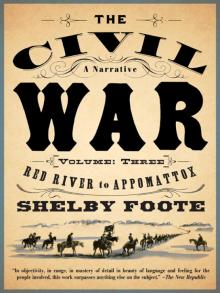 The Civil War: A Narrative: Volume 3: Red River to Appomattox
The Civil War: A Narrative: Volume 3: Red River to Appomattox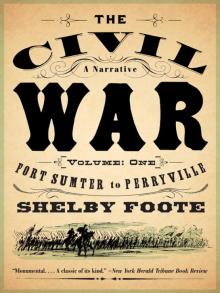 The Civil War: A Narrative: Volume 1: Fort Sumter to Perryville
The Civil War: A Narrative: Volume 1: Fort Sumter to Perryville Jordan County
Jordan County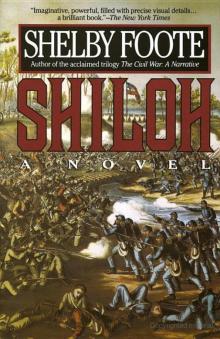 Shiloh
Shiloh Love in a Dry Season
Love in a Dry Season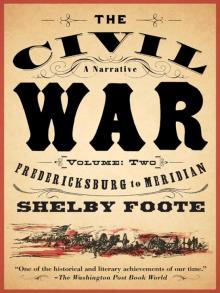 The Civil War: A Narrative: Volume 2: Fredericksburg to Meridian
The Civil War: A Narrative: Volume 2: Fredericksburg to Meridian Chickamauga
Chickamauga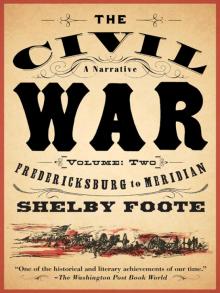 The Civil War: A Narrative: Fredericksburg to Meridian
The Civil War: A Narrative: Fredericksburg to Meridian